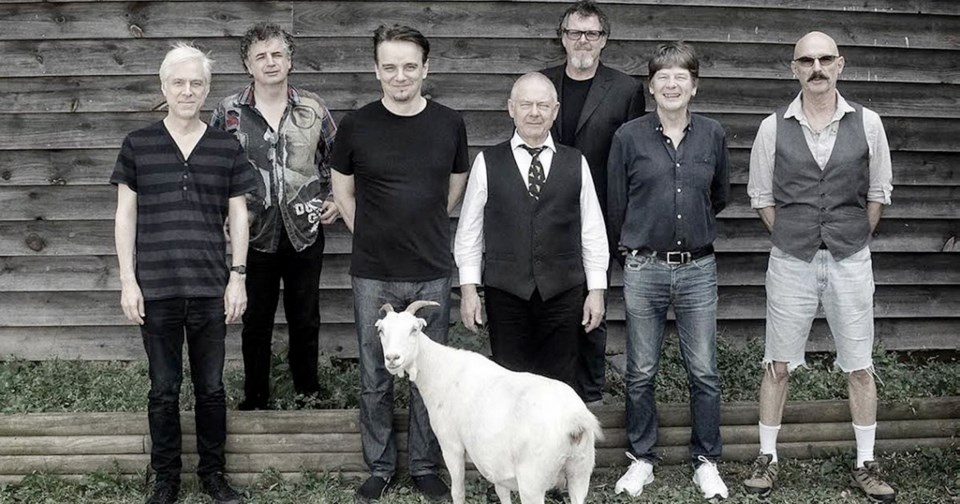What: King Crimson
When: Sunday, 8 p.m.
Where: Royal Theatre
Tickets: $89.75-$214.50 at rmts.bc.ca, Royal McPherson box officeor 250-386-6121
The nebulous nature of King Crimson — whose membership has seen nearly 30 musicians come in and out of the group since 1969 — doesn’t lend itself to an easy explanation.
Equally difficult to articulate is the sound of King Crimson. That is something singer-guitarist Jakko Jakszyk says he has never bothered to do because when you’re in the group, you simply buckle your seatbelt and hang on.
“Quite often, the people making the music don’t really understand what it is about that music that people like,” Jakszyk said from a Calgary tour stop.
“It’s like if you stick your face right in front of a TV screen, you’re not going to see it properly. You need to stand back.”
The revered progressive rock outfit, which currently comprises four Americans and three Britons, reunited last year with its eighth incarnation.
Interestingly, the line-up of Jakszyk, Tony Levin (bass, vocals), Mel Collins (saxophone, flute), and Robert Fripp (guitar) is augmented by three drummers — Gavin Harrison, Bill Rieflin and Pat Mastelotto.
“The way it works is extraordinary. There’s a choreography to it,” Jakszyk said of the percussion-heavy lineup, which makes its Victoria debut Sunday.
“It’s not just three guys belting s--t out. It’s not so much three drummers as one drummer with 12 limbs.”
This news wouldn’t surprise longtime fans. King Crimson is known for being musically dexterous and invariably adventurous.
The band is led by the enigmatic Fripp, who is ranked No. 62 on Rolling Stone’s list of the 100 Greatest Guitarists and has had some fleeting moments in the pop field, including playing lead on David Bowie’s Heroes. But his most acclaimed work to date has been done at the helm of King Crimson.
Part of what makes him tick is the desire to turn expectations on end. Though he was thought to be retired from King Crimson in a concert capacity, Fripp suddenly reformed the band for concerts in 2014 — without longtime frontman Adrian Belew, who had done a 25-year stint with the group. That was one of many changes. Now, with close to a year of concert-playing under its belt, the group has found its footing as an individual entity, Jakszyk said.
“It’s Robert’s vision but there is a musical, harmonic connection between all the line-ups. Robert’s choices of who goes into the group, they are instinctive. We don’t have to sit down and take an exam.”
Jakszyk, 57, first saw King Crimson in concert in 1971, when he was 13. To find himself performing alongside his guitar hero all these years later is an extraordinary turn of events, he said.
“It felt like a very significant moment when I went to see them [at 13]. It felt like it changed my life on some level. You look back at that and see the slightly over-romanticized view of a teenager back in England, but then this happens, you think: ‘Well, maybe not.’ ”
Credit that mystique to Fripp, one of the most talked-about musicians in progressive rock.
The inventor of a looping technique known as Frippertronics, his singular vision has certainly made some enemies along the way.
A book by Sid Smith, In the Court of King Crimson, chronicled the history of the band from 1968 to 2001. Between the covers, a number of ex-King Crimson members spoke to Smith about Fripp’s obtuse nature when it came to running the band.
Jakszyk, who was asked by Fripp in the early 2000s to lead the 21st Century Schizoid Band, a King Crimson “alumnus group,” has nothing but nice things to say about Fripp. As for what he thinks of Fripp’s portrayal in the book, in which his current bandmates are quoted, he noted “there’s several answers” to such a question.
“A lot of what was going on had more to do with [the former bandmates] than it did with the person [Fripp] they were talking about. That’s point one. Point two: We can all be different people at different times. All you can do is judge people on a one-to-one basis. And thirdly, if there’s one thing Robert doesn’t like me saying, it’s what a nice bloke he is and how easy he is it to get on with.
“So the official answer to your question is he’s a complete f-----g nightmare.”
King Crimson’s tour dates last year were all preceded by an announcement asking fans “to be in the moment” and not take pictures, Jakszyk said. During the first of three Toronto shows this month, however, things did not run as smoothly as anticipated.
Despite the no-picture warning, camera flashes were going off repeatedly during the band’s encore. “It just kept happening,” Jakszyk said, so Fripp made the decision to cut short King Crimson’s set by a song.
The band now put large placards on the stage prior to showtime, asking people not to use their cameras. That’s a fair request, according to Jakszyk.
“Some of this music is not easy music to play,” he said. “There are moments where Robert and I are playing variations of the same thing. And we are doing that in one time signature while the rest of the band is playing in a different time signature.
“I don’t care how good you are, you have to concentrate. And with flashes going off, it’s a distraction. The idea that it doesn’t really affect the band — I would vehemently disagree with that.”
